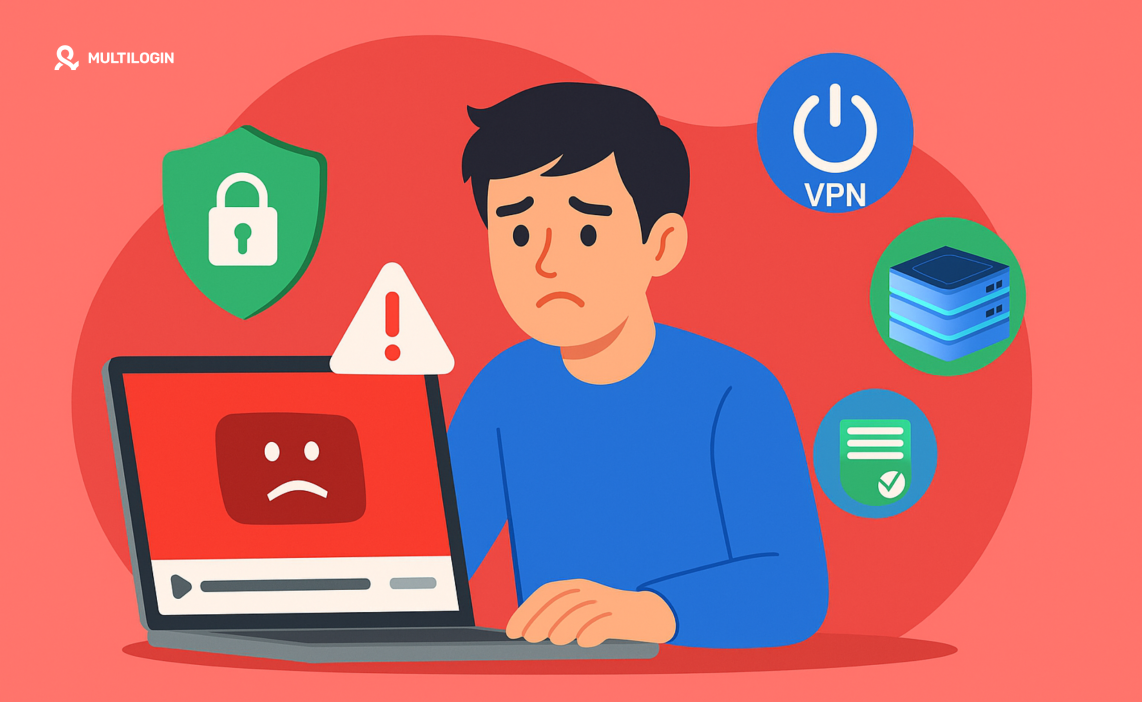Ever opened YouTube and realized it just won’t load — no videos, no comments, not even the home feed? You refresh the page a few times, try another browser, and still get the same result. Your Wi-Fi works, other sites load fine, and yet… YouTube refuses to cooperate.
This might be your first sign of an IP restriction — what many people call an “IP ban.”
But don’t worry — it’s not permanent, and it doesn’t mean YouTube hates you. It’s simply how the platform protects itself from abuse and automation. The good news? You can fix it, test if you’re actually IP-banned, and prevent it from happening again.
Managing high-volume YouTube workflows, data scraping, or multi-account setups? Start your €5.85 plan with Multilogin and test secure mobile and desktop profiles that stay completely undetected — even under YouTube’s strict systems.
Let’s break down everything you need to know about IP bans on YouTube: what they really are, why they happen, how to confirm them, and what you can do to recover.
What “IP Ban on YouTube” Really Means
Before you assume the worst, it’s important to understand what an “IP ban” on YouTube actually means.
YouTube doesn’t generally issue permanent IP bans to normal users. What happens instead is a temporary restriction or rate-limit that looks like a ban but isn’t.
Two types of restrictions:
- Rate limiting — You’ve hit YouTube’s usage threshold. When too many requests (views, comments, downloads, or API calls) come from the same IP, YouTube automatically throttles traffic. This is temporary and usually resets within 24–48 hours.
- Network-level blocking — When your IP is associated with automation, mass downloads, or abnormal activity, YouTube can temporarily block your entire IP from accessing certain functions or even the whole site.
This block can affect every user on the same connection, even if only one person triggered it.
Difference between an IP ban and account ban
Type | Trigger | Scope | Duration |
Account ban | Policy violation (copyright, spam) | Affects Google/YouTube account | Permanent or appealable |
IP ban / restriction | Excessive requests, automation, scraping | Affects your network | Temporary (hours or days) |
So while “banned IP YouTube for downloading too much” sounds dramatic, most users are only rate-limited — not truly banned.
Why YouTube Might Block Your IP
YouTube’s algorithms are designed to detect patterns that don’t look human. It’s not personal — it’s math.
Here are the most common triggers behind IP-based restrictions:
1. Automated scraping or bulk requests
If you use scripts, bots, or browser extensions that pull video data, comments, or analytics at high speed, YouTube’s systems notice. These automated requests flood their servers with traffic, leading to HTTP 429: Too Many Requests responses or temporary IP blocks.
2. Excessive downloading
Maybe you use video downloaders or automation tools to save hundreds of videos quickly. While convenient, these apps often violate YouTube’s fair-use and bandwidth policies. When the system sees hundreds of identical requests from one IP, it flags that as spam behavior.
3. Multiple account sign-ins
If you manage several YouTube accounts — especially across the same IP — the system might link them together and flag suspicious behavior.
This happens a lot for:
- Social media marketers managing several channels.
- Agencies scheduling uploads or monitoring analytics.
- Businesses running ad campaigns from multiple accounts.
4. Shared or low-quality proxies/VPNs
Free or public VPNs recycle the same IPs across thousands of users. If one of them abuses YouTube, the entire IP range can get flagged. That’s why you may suddenly find YouTube “down” only for you — not your friends.
5. Suspicious login locations
Logging in from multiple countries within a short time span also raises red flags. Even if you’re not doing anything wrong, Google’s system interprets it as account hijacking or automation.
Does YouTube IP Ban for Normal Watching?
Not really. Watching videos, subscribing to channels, or leaving comments won’t cause an IP ban.
However, if you’re running tools that simulate human behavior — like auto-refreshers for views, bots for likes, or mass comment scripts — those can get your IP temporarily restricted.
So if you’re a casual viewer, relax — you’re safe. But if you’re managing several channels, scraping data, or automating engagement, you need better protection.
That’s where Multilogin helps: it lets you safely run multiple YouTube accounts without linking fingerprints or triggering YouTube’s detection systems.
How to Check If You’re IP Banned from YouTube
If you suspect your IP is restricted, here’s how to confirm it step by step.
Step 1: Try a different connection
Turn off Wi-Fi on your phone and switch to mobile data. Then open YouTube.
If it loads perfectly, your home or office IP is blocked.
Step 2: Use incognito or another browser
Sometimes it’s not your IP but your cookies or cached data. Try YouTube in incognito mode or a clean browser.
Step 3: Test on another device on the same Wi-Fi
If every device on your network has the same issue, it’s an IP-level restriction.
Step 4: Run network diagnostics
Use these commands:
- Windows: ping youtube.com or tracert youtube.com
- Mac/Linux: traceroute youtube.com
If packets time out, it may indicate that your connection to YouTube’s servers is being dropped.
API Error Codes to Watch For
If you use the YouTube API or automation software, pay attention to these codes:
Code | Meaning | What It Tells You |
403 Forbidden | Your IP or credentials blocked | Stop requests temporarily |
429 Too Many Requests | You exceeded request limits | Wait or change IP |
400 Bad Request | Cookies or tokens corrupted | Clear data |
503 Service Unavailable | Server throttling | Slow down automation |
When you see 429 or 403 repeatedly across tools or browsers, it’s a strong indicator your IP has been flagged.
For a quick reputation check, visit Pixelscan.com or WhoerIP.com to see if your fingerprint or IP appears suspicious.
How to Recover from a YouTube IP Block
You’ve confirmed it — your IP is blocked. Here’s how to fix it safely and efficiently.
1. Reboot your router
Many ISPs use dynamic IPs, meaning restarting your router often assigns you a new one. This alone can clear most minor restrictions.
2. Switch to a mobile hotspot
Hotspots use a completely different IP from your home Wi-Fi. If YouTube loads on mobile data, you’ve just proven your home IP is restricted.
3. Clear cookies and DNS cache
Old cookies can keep sending expired tokens. Clear them via browser settings or run these commands:
- Windows: ipconfig /flushdns
- Mac: sudo killall -HUP mDNSResponder
4. Stop automation temporarily
Pause all scraping, downloading, or bulk comment posting for 24–48 hours. Let YouTube’s system cool down.
5. Use residential proxies
Residential proxies rotate between real user IPs, giving you new, clean identities every session. Unlike datacenter proxies, these are much harder for YouTube to detect or blacklist.
6. Use an antidetect browser
Even if your IP changes, your browser fingerprint can still reveal you. An antidetect browser like Multilogin generates a unique fingerprint for every YouTube session — as if each account were on a different device.
Prevention Plan — Avoid Future IP Bans
Once your access is restored, it’s time to make sure it doesn’t happen again.
1. Respect request limits
Avoid sending hundreds of requests in a short time. If you’re scraping, introduce delays between calls or use rotating proxies.
2. Use the official YouTube API
The API provides structured, rate-limited access to data. It’s much safer than scraping raw HTML.
3. Avoid shared VPNs
Free VPNs might seem tempting, but their IPs are recycled by many users. Paid or built-in proxy solutions are safer.
4. Rotate fingerprints and IPs
Even if your IP changes, identical browser fingerprints make detection easy. Use Multilogin to rotate both seamlessly.
5. Spread activity across profiles
If you manage multiple channels, assign each its own browser profile, cookies, and proxy. This keeps activity siloed and prevents cross-account detection.
Multilogin for YouTube Teams & Agencies
Whether you’re managing five channels or fifty, YouTube’s detection systems don’t make life easy. You can’t log in from the same IP without raising suspicion, and automation tools often cause more problems than they solve.
That’s why thousands of marketers, agencies, and growth teams rely on Multilogin — the antidetect browser designed for smooth, undetectable multi-accounting.
Here’s what makes it stand out:
Separate Browser Fingerprints
Each profile behaves like a real, unique device — complete with custom hardware IDs, fonts, screen sizes, and WebGL data. YouTube sees them as independent users, not one person with ten accounts.
Built-in Residential Proxies
Every Multilogin plan includes proxy traffic, already integrated into the browser. No setup, no external tools — just plug and play.
Mobile Emulation
Run Android-based profiles for mobile testing, comments, or uploads that mimic real devices.
AI-Powered Quick Actions
Create, clone, or launch hundreds of browser profiles in seconds. Perfect for teams managing multiple YouTube or Google accounts.
Team Collaboration
Share profiles securely with teammates. Each can open the same YouTube account session without re-entering passwords or breaking cookies.
Security and Reliability
Profiles are stored securely in the cloud or locally. You control access, data, and sync preferences.
Daily Testing
Multilogin’s technology is tested across 50+ major websites daily, ensuring continued stealth and reliability.
Pricing Snapshot
- Trial: €1.99 for 3 days — includes 5 profiles and proxy traffic.
- Pro Plans: From €5.85/month (annual billing) — 10+ profiles and API access.
- Business Plans: From €103.35/month — 300+ profiles, unlimited team seats, and 10 GB proxy traffic.
Unlike most competitors, every plan includes built-in residential proxies — no extra subscriptions required.
Ready to manage YouTube safely? Try Multilogin for €5.85 — test, automate, and scale your YouTube operations without risking bans or detection.
👉 Don’t risk bans: Try Multilogin and keep your accounts undetected.
Frequently Asked Questions About YouTube IP Ban
Not usually. IP bans are typically temporary and triggered by unusual activity. Permanent restrictions only happen in cases of repeated abuse or serious ToS violations.
Most temporary IP restrictions last from a few hours to a few days, depending on request volume and system resets.
Yes — but free or shared VPNs often reuse flagged IPs. For reliability, use Multilogin’s built-in residential proxies or private proxy networks.
Basic computer literacy suffices for standard multi-account use. Advanced features (automation, API integration) require some technical knowledge, but most users succeed with built-in features and comprehensive documentation.
Getting Started with Multilogin
If you manage multiple YouTube channels, automate uploads, or run analytics scrapers, you need a safer, scalable setup.
Here’s how to begin:
- Sign up for a 3-day trial (€1.99). You get 5 browser profiles and 200 MB of proxy traffic to test all features.
- Create your first profile. Multilogin automatically generates a unique fingerprint that YouTube sees as a new, real device.
- Assign proxies. Use the built-in proxy hub or connect your own residential proxies.
- Launch and work normally. Upload, comment, or analyze safely — each profile behaves like an isolated browser.
- Scale as you grow. Upgrade to Pro (10–100 profiles) or Business (300–10,000 profiles) for enterprise-level management.



